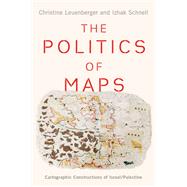The land between the Mediterranean Sea and the Jordan Valley has been one of the most disputed territories in history. Since the establishment of the state of Israel in 1948, Palestinians and Israelis have each sought claim to the national identity of the land through various martial, social, and scientific tactics, but no method has offered as much legitimacy and national controversy as that of the map.
The Politics of Maps delves beneath the battlefield to unearth the cartographic strife behind the Israel/Palestine conflict. Blending science and technology studies, sociology, and geography with a host of archival material, in-depth interviews and ethnographies, this book explores how the geographical sciences came to be entangled with the politics, territorial claim-making, and nation-state building of Israel/Palestine. Chapters chart the cartographic history of the region, from the introduction of Western scientific and legal paradigms that seemingly legitimized and depoliticized new land regimes to the rise of new mapping technologies and software that expanded access to cartography into the public sphere. Maps produced by various sectors like the "peace camps" or the Jewish community enhanced national belonging, while others, like that of the Green Line, served largely to divide.
The stories of Israel's many boundaries reveal that there is no absolute, technocratic solution to boundary-making. As boundaries continue to be controversial and the Israeli-Palestinian conflict remains intractable and unresolved, The Politics of Maps uses nationally-based cartographic discourses to provide insight into the complexity, fissures, and frictions within internal political debates, illuminating the persistent power of the nation-state as a framework for forging identities, citizens, and alliances.








